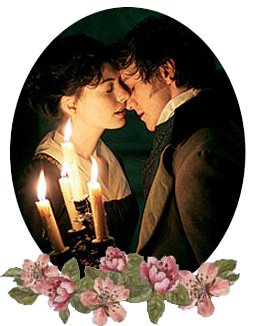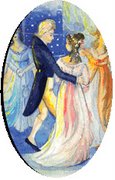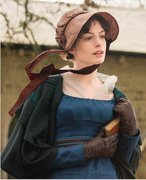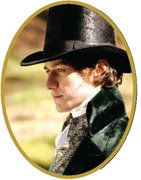The link for the letters is pasted here for you to read:
It is thought that when Jane left Chawton for Winchester in May 1817 she was unaware that it would be the last time that she would see her home for she died in Winchester in her sisters arms on July 18th.
Letter 1: Winchester: Sunday

I think that it is interesting that in the first letter from Winchester, Cassandra begins it with a paragraph that instantly attempts to put Fanny at ease, commenting on the sincere love that Jane had for her and the contribution that Fanny made to her aunts happiness in her final months. This shows the true nature of Cassandra; comforting and kind.
In the third paragraph Cassandra uses the term 'fell away'; this is interesting as it makes us aware that Jane had no desire to leave this world and to me it is infering that she lost control of her body and could not hold on any longer. She also refers to Jane's death as specifically 'her' loss- they were indeed soul mates. This introduces the most beautiful description of how Cassandra felt for her sister; words like 'sun of my life' and 'soother of every sorrow' are so poetic and so very heartfelt.
She is so strong at this time. Perhaps it is shock or perhaps it is the instinctive reaction of this older sister. It is, in my opinion, her way of continuing to be strong for Jane even after her death. Jane would not have wanted Cassandra to be sad and weak, she would have wanted her to play the role that she had her whole life, one involving sense and support to all those who need her.
After a description of Jane's last moments, Cassandra writes 'I mean to afford you gratification whilst I am relieving my own feelings'. This letter is a way for her to open up her feelings and relieve the painful experience she has endured. I get the impression that she has not spoken about her loss of Jane to anyone else until this time?
I think that the line, 'she gave one the idea of a beautiful statue, and even now, in her coffin, there is such a sweet, serene air over her countenance as is quite pleasant to contemplate' is something all us Jane Austen fans can believe. Of course this is here to reassure Fanny and also maybe Cassandra herself but I also like to think that Jane did look this way and in her final moments she was not scared or in pain because she knew that she was going to a better place. A place where she would meet her father again.
Letter 2: Chawton: Tuesday
I love the way that Cassandra acknowledges the closeness between Jane (the angel) and Fanny. The term '
counterparts' is so very special and must have been of such comfort to Fanny at this time. This allows us to appreciate the relationship that these Austen women had, a bond that was so intimate and meaningful.

I think only now is Cassandra's shock starting to wear off. She writes 'Never was human being more sincerely mourned by those who attended her remains than was this dear creature. May the sorrow with which she is parted with on earth be a prognostic of the joy with which she is hailed in heaven!' I have never heard such ardent and affectionate words spoken by one person about another. The relationship that they shared was truly one of a kind and so very special. It must have been impossible for Cassandra to remove the constant thought of her sister in 'every variety of circumstance' that she describes.
She ends with telling Fanny that every wish of Jane will remain sacrad with her. This is important; do you think that when Jane was alive and her popularity as an author was rising, they ever had the discussion that after Jane's death certain letters revealing certain secrets were to be destroyed? It is certainly a possibility. I feel that the love between them would lead Cassandra to do anything in her power to protect the precious memory of her sister.
The talk of them being re-united in heaven sends a shiver down my spine and I am sure that right now Jane, Cassandra and Jane are looking down on us all and smiling.........
Pic 2: Painting of Fanny Knight by Cassandra Austen, from Cecil (1978, p. 160)

 I think that it is interesting that in the first letter from Winchester, Cassandra begins it with a paragraph that instantly attempts to put Fanny at ease, commenting on the sincere love that Jane had for her and the contribution that Fanny made to her aunts happiness in her final months. This shows the true nature of Cassandra; comforting and kind.
I think that it is interesting that in the first letter from Winchester, Cassandra begins it with a paragraph that instantly attempts to put Fanny at ease, commenting on the sincere love that Jane had for her and the contribution that Fanny made to her aunts happiness in her final months. This shows the true nature of Cassandra; comforting and kind.













































5 comments:
Thank you so much, Rachel. I remember the first time I read Cass' letter to Fanny, and the tears welled in my eyes. They were such beautiful words from such a sincere sister...The late Radovici also said that she felt she lost a friend as she finished Cassandra's letter, and I understand her.
'she gave one the idea of a beautiful statue, and even now, in her coffin, there is such a sweet, serene air over her countenance as is quite pleasant to contemplate'
Oh, I truly believe that it was exactly what she looked like. A sleeping angel, a beautiful soul, peace and serene, grateful to be finally released of her decaying body.
Such a strong spirit! I'm reading materials on Addison's and Hodgkin's diseases now, and I realise that Jane actually had more sicknesses than we thought. What a brave creature she was... I am honoured to remember her with this blog.
Thanks for your commemoration of JA's death 190 years ago. Reading it led me to reread all the 1817 letters that JA wrote that survive, as well as the two that Cassandra wrote to Fanny after JA's death.
Two things came to mind:
My sadness when I read Fanny Knight's daybook diaries in Maidstone last month and saw almost NOTHING in them about her aunt's death. Evidence against this virtual silence being a reflection of Fanny's being overwhelmed with grief, I recall (although I don't have my notes in front of me now) that she did have the wherewithal to write about some other matters, almost as though nothing had happened.
When I put that together with Fanny's snobbish Philistine remarks about Jane and Cassandra many years later, when Fanny was a wealthy Victorian society matron, and I think also about Jane's last letters to Fanny, which to me bear some unmistakable aura of protesting too much love and admiration, I get the strong feeling that Cassandra, in writing her first post-death letter to Fanny reassuring Fanny that Fanny really meant so much to Jane, was trying to patch something up, something that Fanny had noticed.
That led me to wonder further about wondered whether there had been some subtle alignment of the 2 aunts and the 2 eldest nieces, i.e., perhaps Jane had been closer to Anna, and Cassandra had been closer to Fanny? After all, they were human beings, and human beings, in families, tend to have those they are closer to, and those they are more distant from. We will never know for sure what was going on among these 4 female hearts.
Of course, the absence of any surviving letter from Cassandra to Anna from that time period immediately after Jane's death appears to be because Anna was at Ashe a small distance from Chawton and so there was no need to write to Anna to condole with her. And Anna was already weighted down by the burdens of motherhood by the time of JA's final illness, and so it is no surprise that we do not hear of Anna visiting Jane at Winchester.
Food for thought.
ARNIE
Mmmm... yeah, I bet Anna did visit Jane (c'mon, Jane was her best aunt!). But I also never read any of her letters about it. Caroline, OTOH, did visit JA.
About Fanny to Cass and Anna to Jane, you might be right... the way Edward was to Cass and Henry to Jane. There are tendencies like that in any families, also among friends, nothing wrong with that...
By the way, what comment did Fanny say later on, Arnie? Can you direct me to any particular letter?
In 1869, Fanny (now Lady Knatchbull--what a great name for a pompous snob!) described Jane Austen as "very much below par as to good society and its ways." She believed that it was only due to her rich father (i.e., Edward) and his superior connections that her aunt was rescued from "commonness and a lack of refinement".
I don't have the specific cite on the entire letter.
There is a bio by Margaret Wilson entitled "Almost Another Sister: Fanny Knight, Jane Austen's Favourite Niece" which I have not read, but I believe that title was intended to be read, at least in part, ironically.
I am going to try to get hold of that book.
She did not?!
I mean, not that I doubt you, Arnie... I'm just surprised that Fanny actually SAID that. It's so... uh, pretentious of her to say that. Uh... I need to read the book myself to believe it. Why would she say that...?
Anyway, thanks for the info, mate!
Post a Comment